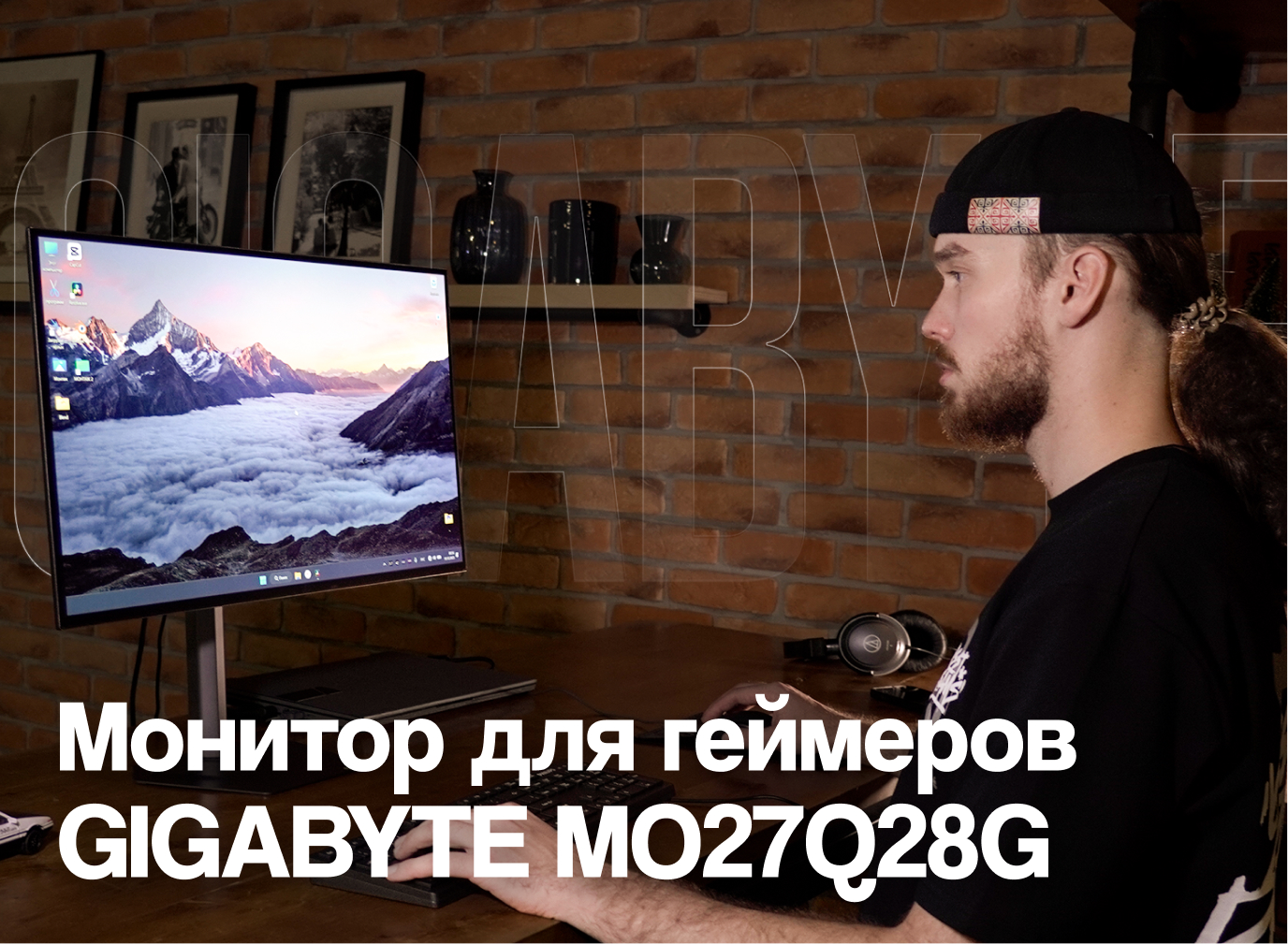In recent years, the world has dramatically shifted towards remote work, education, meetings, interviews, and even exams. This transition to online environments has brought about significant challenges, especially in exam monitoring. Imagine a student using cheat sheets, software aids, or even having a top-performing friend take the test for them. While these scenarios may seem amusing, nobody would want to consult a doctor who passed their exams through such dishonest means.
To ensure fairness in exams, proctoring systems have been developed globally to monitor online tests. These systems can verify the identity of the test-taker, track the use of unauthorised software, detect the connection of a second screen, and identify other dishonest tactics students might use.
Abay Etekbaev, the founder of OES and a resident of Astana Hub, shared with Er10.media how the OES system guarantees transparency in exams and interviews.
Follow Kazakhstan’s Startup Movement in the "100 Startup Stories of Kazakhstan", a collaborative project by ER10 Media and Astana Hub. This initiative highlights the most innovative Kazakh startups, showcasing projects that stand out for their creativity and impact. Among the heroes are Astana Hub residents, as well as creators of other innovative technological products and services. The content is available in Kazakh, Russian and English.
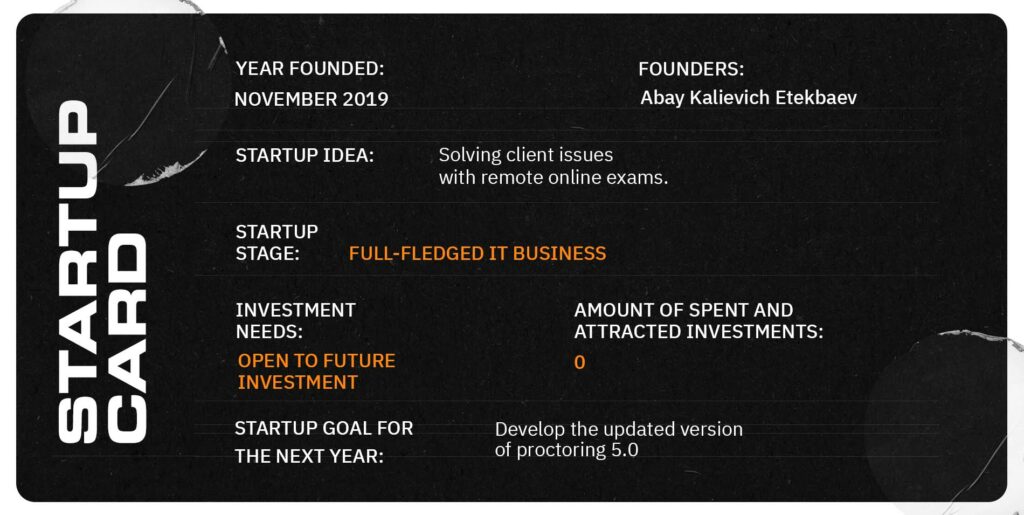
How Did Your Startup Begin, and Why Did You Enter the Education Sector?
"We've been in the IT development market since 2015. Initially, we created websites and simple information systems, set up, and managed online advertising. These products were typically turnkey solutions for private commercial entities. Gradually, we moved on to developing portals and complex information systems for government institutions.
Once, we developed an LMS (Learning Management System) platform for a Kazakh university, featuring an electronic grade book, webinar functions, class, and exam schedules. However, it didn't gain popularity due to implementation challenges and the availability of free alternatives."
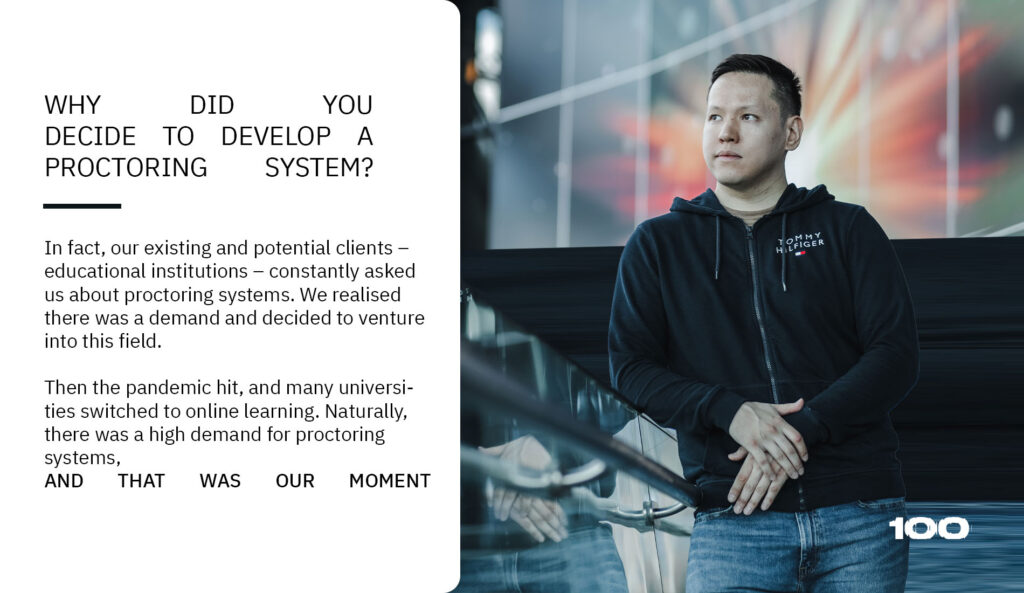
Why Did You Decide to Develop a Proctoring System? Was It a Personal Experience or Did You Identify a Market Need?
"In fact, our existing and potential clients – educational institutions – constantly asked us about proctoring systems. We realised there was a demand and decided to venture into this field.
After evaluating the market, competitors, and prospects, we thought we could focus our efforts in this direction. In 2019, we decided to create a proctoring system. We studied the CIS and global markets, analysed competitors' strengths and weaknesses. Initially, it was just a working idea that we hadn't yet dared to implement.
However, in the winter of 2019, a client requested a proctoring service from us. We got to work and soon presented the first version of the system to the client, who subscribed to it. Of course, it was just the initial version, lacking face recognition, notifications, and other modern features. It included basic functions like webcam, desktop, and sound recording for later review. Most importantly, our program worked and fulfilled its purpose.
Then the pandemic hit, and many universities switched to online learning. Naturally, there was a high demand for proctoring systems, and that was our moment."
How Did You Conquer the Market?
"Initially, unlike competitors who charge per exam, we entered the market with affordable and attractive prices. We offered clients 10 TB of disk space for a fixed price of 450,000 tenge. Essentially, a university could conduct up to 30,000 sessions for that amount, with an average cost per exam being 15 tenge. In comparison, Russian competitors charged 100 to 200 roubles per exam, depending on the features. Our services were much cheaper.
Thanks to this pricing policy, we were able to work with 15 educational institutions during the first 'pandemic' session and signed contracts. As a result, we continued to refine our OES system, creating a fully-fledged first version of the product. Currently, the fourth version is in use, and the fifth version is under development. I can proudly say that the system is 100% made in Kazakhstan."
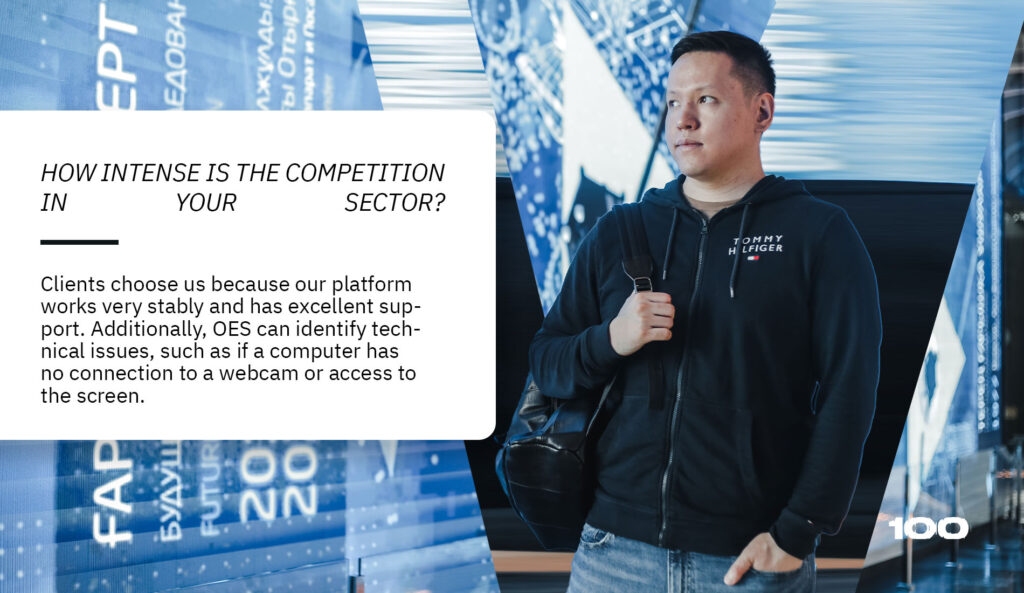
How Intense is the Competition in Your Sector?
"There are three main Kazakh companies in the proctoring sector on the local market: our OES, Oqylyq.kz, and Platonus.
Clients choose us because our platform works very stably and has excellent support. Additionally, OES can identify technical issues, such as if a computer has no connection to a webcam or access to the screen. The system can suggest solutions – reboot the computer, enable camera access, disable antivirus, and more."
Tell Us About the Main Features of the OES Platform.
"OES fully controls the user's camera, microphone, and screen throughout the entire exam using artificial intelligence, computer vision, and other modules. The examiner receives a detailed report with user behaviour analytics. Based on this data, the examiner can determine how honestly the student took the exam. Each violation of the regulations has its rating. If a student commits serious violations, the test can be annulled.
OES includes features such as 99% accurate face recognition, equipment verification, detection of unauthorised persons, head turns, text copying attempts, browser and desktop control, detection and blocking of a second monitor, identification of user absence or substitution, right-click blocking, noise level adjustment, anti-spoofing (detecting when a user shows a photo instead of a live face), and much more.
Students can also scan a QR code with their smartphone to connect a second camera and place it to the side for a double view, preventing the use of paper cheat sheets.
The system also supports different types of proctoring – asynchronous, automatic, and synchronous. Depending on the situation, testing can be conducted in the presence of an examiner or automatically with report and video recording. The system is very flexible and offers many capabilities."
Can a Student Outsmart the Proctoring System?
"Theoretically, any proctoring system can be bypassed if one knows how and is technically very savvy. Therefore, we continually improve the product, and the system records any suspicious actions, notifying the examiner.
We are preparing an update that will allow controlling and blocking remote connections from other users using programs like TeamViewer and AnyDesk. It will detect the connection of a second mouse or keyboard, analyse network connections, and technical characteristics of the user's computer. The system will be able to disable third-party programs that could affect the exam process.
In its fifth version, OES will become a full-fledged kiosk for taking exams and tests."
Is Your System Used Outside of Educational Institutions?
"Yes, it is an excellent tool for HR professionals. With OES, you can select personnel, conduct internal and external assessments, as well as certification and evaluation of staff. We already have clients using the system in HR."
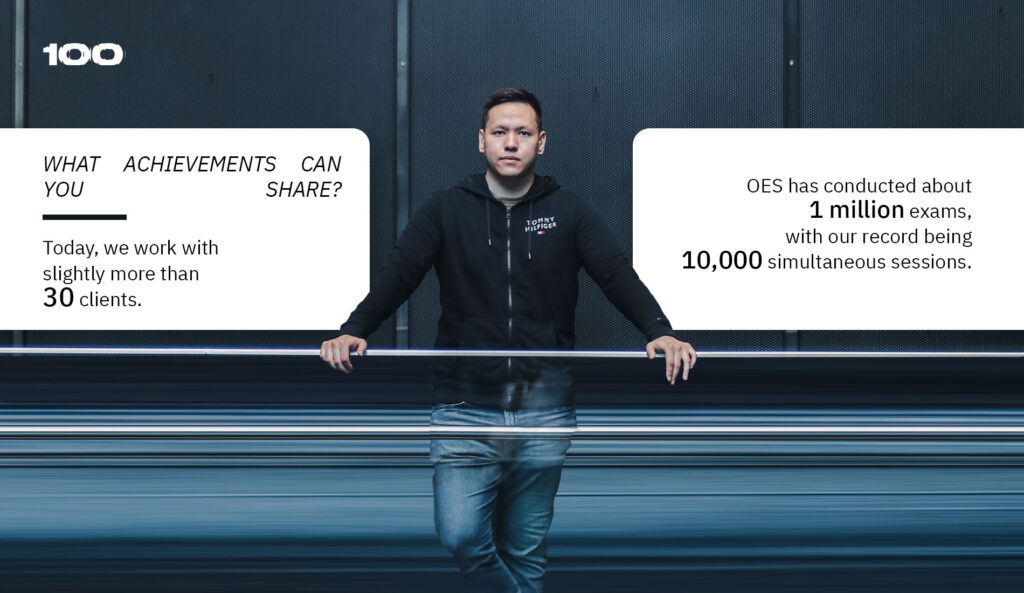
Can Your Startup Be Considered an Established Serious Business? What Achievements Can You Share?
"Today, we work with slightly more than 30 clients. OES has conducted about 1 million exams, with our record being 10,000 simultaneous sessions.
Another product worth mentioning is our webinar system, OES. With it, you can conduct online classes and meetings with students. The product includes features like video and audio communication, status indicators, chat, session recording, screen sharing, presentation uploading, voting, and auxiliary tools like markers, pencils, erasers, and more. The system handles up to 2,000 simultaneous connections with no room limits."
What Challenges Have You Faced as the Startup Developed? Were You Able to Overcome Them?
"Primarily, these were technical difficulties. The proctoring system is quite complex and resource-intensive. It requires capturing video and audio from the user, recording and analysing data. Creating a reliable and fault-tolerant system was the most challenging task."
What Are Your Future Plans? What Markets Do You Plan to Conquer and Where Do You Intend to Scale?
"We plan to scale to neighbouring countries – Uzbekistan, Azerbaijan, Armenia, and Kyrgyzstan. Currently, we consider the CIS countries as potential markets."
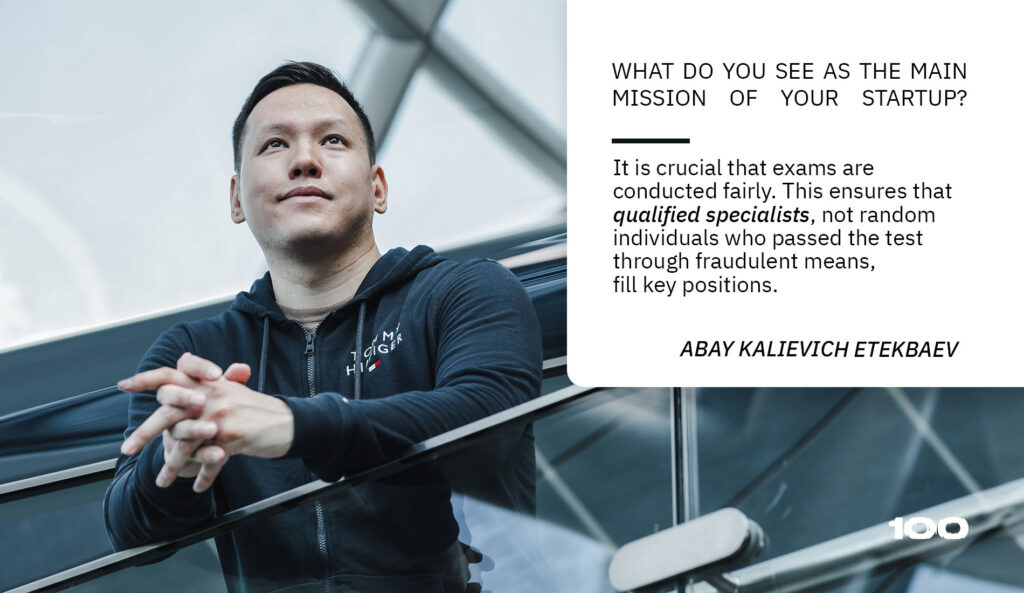
What Do You See as the Main Mission of Your Startup? What Is It?
"It is crucial that exams are conducted fairly. This ensures that qualified specialists, not random individuals who passed the test through fraudulent means, fill key positions.
Additionally, proctoring systems prevent corruption. For example, a teacher cannot give a student a good grade in exchange for a reward. I believe proctoring systems play a very important role today."
What Is the Future of Your Startup and Your Industry?
"I think more processes will move online – exams, meetings, interviews, and much more. Consequently, proctoring systems will evolve and improve to eliminate fraud and increase the transparency of many processes. Artificial intelligence will be increasingly implemented to automate many functions. In reality, proctoring systems address many client pains, but not everyone has realised this yet."




